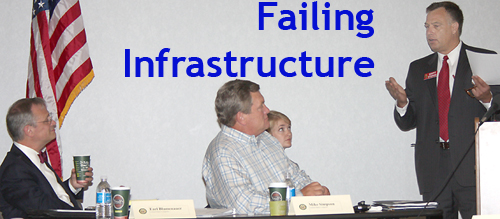
| CONNECTIONS |
IDAHO
ITD
HOME
511 TRAVEL SERVICES
IDAHO
DMV
ITD
NEWS
HIGHWAY
SAFETY
IDAHO STATE POLICE
STATE OF IDAHO
NIATT
NATIONAL
AASHTO
AAMVA
AAA of IDAHO
FEDERAL HIGHWAYS
FEDERAL AVIATION
IDAHO STATE POLICE
NHTSA
NTSB
TRB
U.S. DOT
TRANSPORTER
Archives
Milestones
Comments
Idaho
Transportation
Department
Office of Communications
P.O. Box 7129
Boise, ID 83707
208.334.8005
Fax: 208.334.8563


ITD Deputy Director Scott Stokes:
Integrated transportation system would be
more
efficient with fewer levels of federal review
Imagine what the nation’s transportation system would look like today if there hadn’t been a commitment more than a half-century ago to build interstate highways.
“How could you possibly quantify the economic stimulus that we have enjoyed for 50 years?” Deputy Director Scott Stokes asked Thursday when Reps. Mike Simpson (R-Idaho) and Earl Blumenauer (D-Ore.) met with local officials in Boise.
As a “bridge” state, Idaho plays a key role in connecting national commerce, moving products along the state’s highways. Stokes said Elko, Nev., is far removed from an interstate, yet it also plays a bridge role and takes advantage of the national system.
“This national system of modern freeways is now 52 years old,” Stokes reminded the crowd of about 60 people. “It is in our national interest to consider how to best preserve and perpetuate this system – even the entire national highway system that is so critical to our nation’s economy, our prosperity, health, safety, and on which we rely for our life-sustaining products.
“We can’t leave it to the residents of Elko to perpetuate and renew this national system.”
Consider the remaining transportation infrastructure, he said. “The interstate system alone cannot serve the needs of the nation. For the system to work properly, we must also maintain efficient state highways, reliable county collectors and farm-to-market routes, city arterials and connecting routes.”
'We strive to spend every dollar we receive as efficiently as possible at the Idaho Transportation Department and consequently, we want to deliver projects to the people of Idaho as quickly as possible.' —Scott Stokes ITD Deputy Director |
The deputy director reviewed four factors that are significantly impacting Idaho’s transportation system – factors that have been discussed during a statewide series of seven meetings sponsored by Idaho Gov. C.L. “Butch” Otter and the Idaho Transportation Board.
Dramatic growth, flat revenue, inflation and the aging transportation system make it difficult for ITD to maintain a modern, efficient system, he explained.
“How do we tackle the problem on the federal level?” Stokes asked.
He said new federal requirements compound the funding dilemma and impede the delivery of construction projects in a timely, efficient manner.
“We strive to spend every dollar we receive as efficiently as possible at the Idaho Transportation Department and consequently, we want to deliver projects to the people of Idaho as quickly as possible.”
Stokes called for environmental streamlining that will help reduce the time required to move projects from planning to completion. A National Surface Transportation Policy and Revenue Study Commission, established by Congress, recently indicated that major highway projects take about 13 years from development to completion.
Climate change legislation that puts a “cap-and-trade” provision on highway projects adds a new, unnecessary level of control, he emphasized. “Under federal law today we already go through a lengthy and complex planning process supervised by the U.S. Department of Transportation. So, the climate change legislation apparently would add a new layer to the process…”
He said that a new “fiscal constraint” provision also would add unneeded requirements to the planning process.
“As a state agency, we can’t spend what we don’t have. We don’t need USDOT supervision to confirm that… Hopefully we can reduce this burden next year when Congress considers highway legislation.
Stokes concluded by reminding the Congressmen and other officials of the important role Idaho transportation plays in a national economy.
“The national interest in facilitating interstate commerce and motility is clearly served by good highways in and connecting across rural states. And we cannot take these roads for granted,” Stokes said in summary.
Published 9-5-8